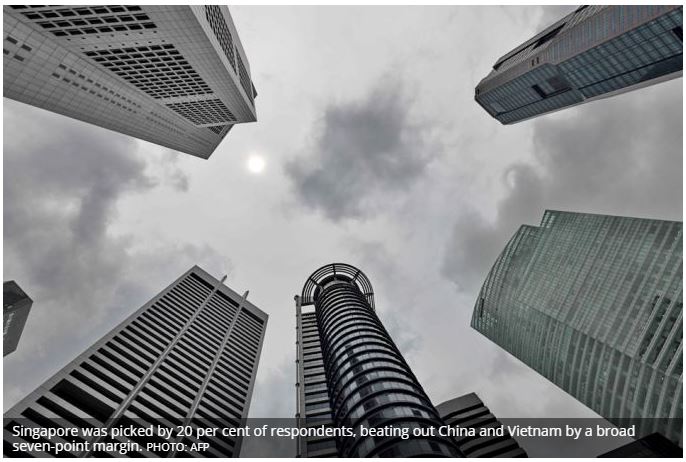Business climate worsens, but Singapore’s prospects still beat China’s, survey finds
GLOBAL trade woes may send some business Singapore’s way, but uncertainty is still weighing down companies’ near-term outlook.
This is the take-away from the latest Business Times-Singapore University of Social Sciences (BT-SUSS) Business Climate Survey, which polled 157 firms from Sept 18 to Oct 17.
Companies reported weaker business performance in the third quarter, and their outlook for the six months to end-March was largely pessimistic. The last time that the quarterly survey turned up negative readings for all four key indicators was a year ago.
But a fifth of the firms still named Singapore as the market with the rosiest prospects for the year ahead.
CIMB economist Song Seng Wun said the survey’s findings were largely consistent with on-the-ground observations of a rise in cautiousness. He attributed this to “a lot of uncertainty brought about by the trade tensions” between the United States and China.
The sales net balance fell by seven points to negative 1 per cent in the third quarter; the net balance for orders and new business plunged 16 points to negative 8 per cent – pointing to a shrinking of the pie.
Weighted net balances reflect the difference between the proportion of companies reporting an increase and those seeing a decrease.
Profits net balance lost 16 points to negative 17 per cent, while business prospects turned gloomy, down 18 points to negative 3 per cent.
BT-SUSS project consultants Chow Kit Boey and Chan Cheong Chiam wrote: “Should the sales net balance in the next two quarters decline into negative territory, then the current sales expansion phase will have been the shortest since the survey began in Q4 1995.” They defined contraction as two quarters of negative net balances – not counting this past quarter, as negative 1 per cent was deemed a negligible difference from zero.
“The last sales expansion spanned six quarters (Q1 2010 to Q2 2011), whereas previous expansions were of longer duration,” they noted.
But, despite the slump, the situation still looks better than the contraction in the third quarter of 2017, when sales, profits, and orders and new business posted negative double-digit net balances and the business outlook was negative 9 per cent.
Mr Song attributed the year-on-year improvement, in part, to global risk levels – including nuclear fears on the Korean Peninsula – having eased over the past year.
Maybank Kim Eng senior economist Chua Hak Bin told The Business Times that the domestic labour market picked up in that period, with wages up and job growth recovering.
Manufacturers posted the best overall quarterly performance across all sectors polled – similar to the year-ago period – with the trend led by large and local companies.
Manufacturing tied with transport and communications as the sectors most upbeat about the next six months.
Sentiment slipped in financial and business services, where activity contracted in the quarter.
On the whole, companies were more optimistic about the six-month outlook for overseas markets, where the net balance of 4 per cent out-polled the overall negative figure.
Yet Singapore was the most popular when it came to ranking countries’ prospects for the next 12 months. It was picked by 20 per cent of respondents, beating out China and Vietnam – which shared second place – by a broad seven-point margin.
China had held the pole position seven times since 2006, including last year, while Vietnam made the top three only in 2007 and 2015. Indonesia, meanwhile, missed the winners’ podium for the first time since 2007.
“Compared with a year ago, Singapore and Vietnam are viewed with relatively better business prospects, while China and Indonesia are seen by fewer companies as holding best business prospects in the next 12 months,” wrote Ms Chow and Mr Chan.
Manufacturers also rated business prospects in the US and China lower than they did a year ago. “This reflects the adverse impact of the ongoing trade war on the two countries,” said the survey consultants.
Maybank Kim Eng’s Dr Chua told BT that the Republic could feel the pinch from cooling business sentiment in the near term, but added: “As companies decide to relocate, Singapore may benefit as a location that attracts some of the business.”
CIMB’s Mr Song cited Singapore’s free-trade agreements with the US, China and the European Union, saying that companies looking to divert their supply chain see the city-state as a good place to have a presence.
“The direction is fairly clearly down, but it may not be down as much, he said, adding that there is room for upside surprises. “But obviously, as we ride on global growth volume, if the volume in goods and services were to come off, any new business may not be able to offset that.”
A regression analysis of the survey results projects fourth-quarter gross domestic product (GDP) growth of 1.8 per cent to 2.5 per cent, which would take the full-year expansion to between 3.3 per cent and 3.5 per cent.
The Bloomberg consensus forecast among private economists is for 2.5 per cent GDP growth in the fourth quarter, and 3.3 per cent for the year.
Source: https://www.businesstimes.com.sg/government-economy/business-climate-worsens-but-singapores-prospects-still-beat-chinas-survey-finds


 Thailand
Thailand




